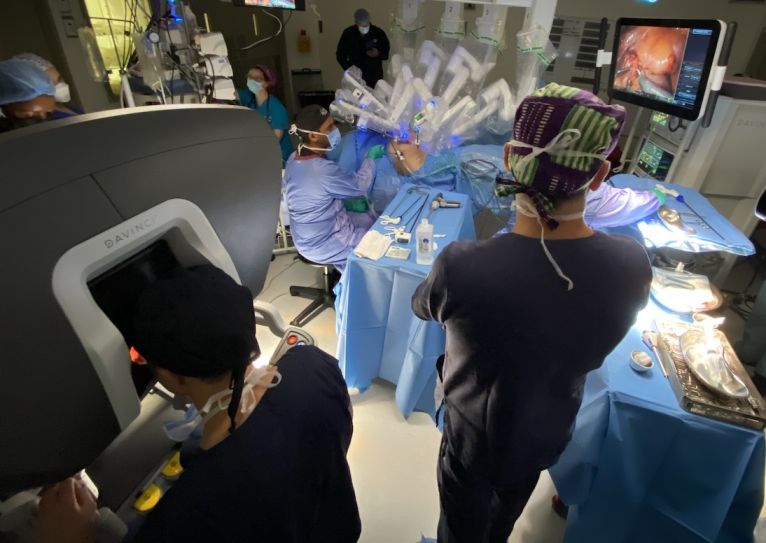ROBOTIC SURGERY:
Prioritising quality of life after colorectal surgery
Robotic assisted surgery is a minimally invasive technique, where a surgeon controls the four arms of a operating robot. It has emerged as a transformative approach, offering a host of benefits to patients, particularly in the area of nerve preservation.

The field of medicine has witnessed remarkable advancements in recent years, and the realm of colorectal surgery is no exception. Robotic surgery is a minimally invasive technique. It has emerged as a transformative approach, offering a host of benefits to patients, particularly in the area of nerve preservation and subsequent quality of life..
Robotic surgery employs a state-of-the-art robotic system that allows surgeons to perform complex procedures with assisted precision and control. It provides several advantages over traditional laparoscopic surgery:
- Enhanced Visualization: The robotic system's high-definition 3D camera provides surgeons with a magnified, stereoscopic view of the surgical field, enabling them to visualize delicate anatomical structures with exceptional clarity.
- Improved Dexterity: The robotic arms, are equiped with effective elbows and tremor-filtering technology. They offer surgeons superior dexterity and range of motion, allowing them to perform intricate maneuvers with greater precision and control, in difficult & confined spaces.
- Reduced Surgical Trauma: Robotic surgery minimizes the incisions required compared to open surgery, leading to less tissue damage, reduced blood loss, and a shorter recovery time for patients.
- Expanded Minimally Invasive Options: In normal laparoscopic surgery, if a surgeon struggles, they may be forced to convert to open surgery. Robotic surgery offers such improved surgical ability, it allows the surgeon to do more using minimally invasive techniques, potentially avoiding conversion to open surgery. This means an operation that used to require open surgery, is now potentially possible using robotic minimally invasive approaches.
These advantages of robotic surgery are particularly beneficial in coloproctology. The improvement in dexterity means the surgeon is more likely to complete difficult cases with a minimally invasive approach. The pelvis is a confined space with poor visibility in open surgery. The pelvic working field is surrounded by important nerves that may be pulled into the surgical field by the tumour.
The delicate nerves surrounding the rectum and colon are crucial for functions such as continence and sexual function. Damage to these nerves can lead to significant complications, including incontinence, erectile dysfunction, and loss of sensation. The robot improves visibility and dexterity – maximising the chances of nerve preservation.
Robotic surgery's enhanced visibility, precision and dexterity enable surgeons to dissect and mobilize these delicate structures, significantly reducing the chances of nerve damage and preserving patient quality of life.
Patient Benefits of Robotic Surgery in Coloproctology:
- Reduced Nerve Damage: Studies have shown that robotic surgery is associated with a lower rate of nerve damage compared to traditional laparoscopic surgery.
- Improved Continence: Robotic surgery can help preserve continence, reducing the risk of postoperative incontinence.
- Enhanced Sexual Function: Robotic surgery can minimize the risk of sexual dysfunction, preserving patient intimacy and quality of life.
- Faster Recovery: Robotic surgery typically results in a shorter hospital stay and a quicker return to normal activities.
Robotic Surgery in Cape Town:
Robotic surgery is gaining traction in Cape Town, with several leading hospitals and surgeons adopting this innovative technique. Patients in Cape Town can now access the benefits of robotic surgery for a range of coloproctological procedures, including:
- Total Mesorectal Excision (TME): A specialized procedure for rectal cancer
- Abdominoperineal Resection: Removal of the rectum and anus
- Ventral Mesh Rectopexy: Surgical repair of rectal prolapse
Why do Medical Aids often not cover Robotic Colorectal Surgery?
Cost: Robotic colorectal surgery is more expensive than traditional laparoscopic surgery. This is because the robotic equipment is very expensive to purchase and maintain. Medical aids may not be willing to cover the cost of this equipment, especially if they believe that the benefits of robotic surgery do not outweigh the costs.
Evidence: There is still some debate about the benefits of robotic colorectal surgery over traditional laparoscopic surgery. While the benefits to the operating surgeon may seem obvious; where for example the nerves are clearly visible, it is difficult to translate this benefit into statistics that the medical aids will use and believe.
Some studies have confirmed that robotic surgery can lead to improved nerve function, shorter recovery times and fewer complications. Robotic cases also have a learning curve, with potential for higher complications as the team is learning. Medical aids may be waiting for irrefutable evidence, or for the technology to become cheaper, before they are willing to cover robotic surgery costs.
Availability: Robotic colorectal surgery is not yet widely available in South Africa. The equipment is expensive and not many surgeons have completed their training. Medical aids may not want to cover a procedure that is not readily available to their members.
Despite these challenges, there is a growing movement in South Africa to make robotic colorectal surgery more accessible. Some medical aids are starting to cover the procedure, and there are a number of hospitals that are investing in robotic equipment. As the technology becomes more widely available and the evidence of its benefits grows, it is likely that robotic colorectal surgery will become more common in South Africa.
Here are some additional reasons why medical aids may not cover robotic colorectal surgery:
- Medical aids may not believe that the benefits of robotic surgery justify the additional cost.
- Medical aids may be concerned about the potential for overuse of robotic surgery.
- Medical aids may not want to set a precedent for covering new and expensive technologies.
Ultimately, the decision of whether or not to cover robotic colorectal surgery is up to each individual medical aid. Patients who are interested in robotic surgery should talk to their medical aid to see if it is covered. It is only through patient advocacy that things will change.
Conclusion
Robotic surgery is a transformative technology that is rapidly gaining acceptance in South Africa. Its enhanced precision and improved dexterity make it an ideal choice for complex procedures, particularly those that require delicate nerve preservation. While robotic surgery is not yet covered by all medical aids, many patients are choosing to self-pay for this procedure due to its specific benefits.
